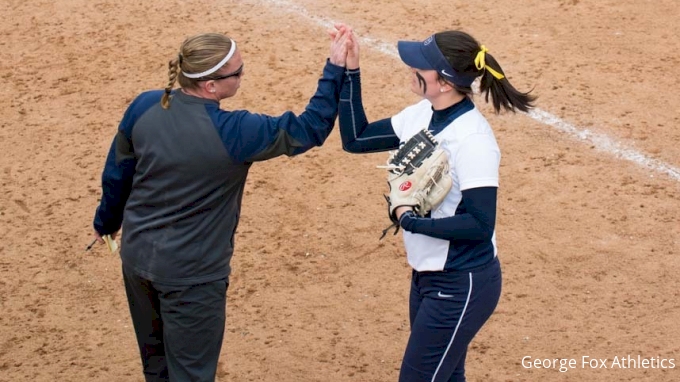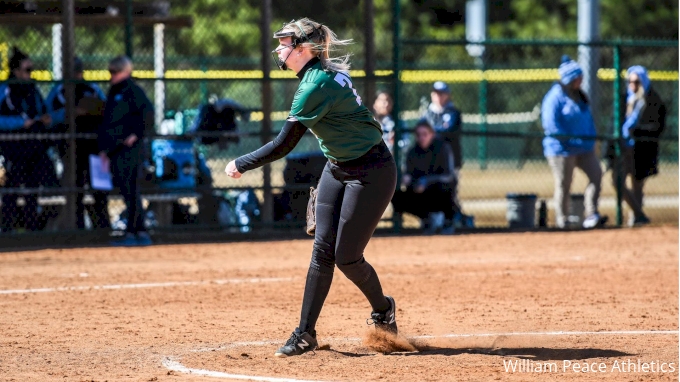How Division III Softball Is Adapting To Change For The 2020-21 Season
How Division III Softball Is Adapting To Change For The 2020-21 Season
What to expect for the 2021 Division III softball season: practice, scheduling, and competition. Tufts, George Fox, William Peace, and Luther weigh in.

Mark Allister is the author of Women’s College Softball on the Rise: A Season Inside the Game. He will be writing on DIII softball this spring and would welcome story ideas and comments at allister@stolaf.edu
After the creation of the United States Constitution, Benjamin Franklin wrote in a letter to Jean-Baptiste Leroy, a French physicist and friend, that “in this world, nothing can be said to be certain, except death and taxes.” Perhaps this oft-quoted phrase should, in our COVID-era, be amended — what is now also certain is uncertainty. Looking ahead to 2021, softball coaches and players are simply hoping that some semblance of a season will emerge, though no one is quite sure in December what that season might end up looking like.
The Fall: Practicing For A New Normal
In past years, the NCAA gave softball programs a set number of consecutive weeks to practice and play, and coaches created a schedule of games and practices both for fall ball and the regular season that fit into that number of weeks. But in one welcome COVID-era change for DIII softball coaches, a new NCAA provision for 2020-21 gave the coaches 114 days of “athletics-related activity” that could be used at any time during the school year.
An institution’s choice of on-campus or distance learning greatly impacted athletes in fall 2020, because schools who chose distance learning had no teams gathered to practice. But for schools who did open campuses, the new rule helped teams have a positive fall ball experience even amidst the hassles of the new protocols. Rather than practice four times a week for four weeks — a common schedule for fall prior to 2020 — a coach could now spread those 16 days through six or seven weeks, which helped team bonding and the development of individual skills.
Jessica Hollen, the head coach at Oregon’s George Fox University, said that her fall ball went very well. “Our students were back on campus,” Hollen said, “so we were able to practice if we followed the protocols about distancing and wearing masks. Spreading out practice days over more weeks helped us. I love this rule and hope we’ll be able to continue it into upcoming years.”

Even more enthusiastic than Hollen about her fall ball season was Tufts head coach Lauren Ebstein, whose team is in the New England Small College Athletic Conference, comprising 11 highly selective liberal arts schools. “Fall ball was terrific for us,” Ebstein said. “The NESCAC doesn’t normally have a non-traditional (fall) season, so I don’t get to practice with my kids at all. But the conference was feeling that so much has been taken away because of the pandemic, that it would be nice to give the athletes something. The league administrators know that players practice on their own, or with captains, and the belief was that the practices could be made safer if they were actually supervised. So for us, the fall was great. For the kids, to have softball was such a nice thing for them, particularly to connect with their teammates. We had to practice in groups of ten or less, and they stayed apart. But we were able to break things down in ways that we don’t usually get to do.”
Tufts softball had no positive COVID tests, and so Ebstein was able to follow her practice schedule, a circumstance not true for many coaches around the country. Perhaps more typical was a fall ball of fits and starts. Practices often got scheduled and then called off, whether for pandemic reasons or weather. A positive test for a player could result in a head coach having to quarantine, setting back any plans.
There’s excitement to see how the “114-day rule” might work post-COVID. At the recent convention of the National Fastpitch Coaches Association, 87 percent of the coaches attending (virtually) the DIII caucus said that they’d prefer the new rule be made permanent. Coaches could then put together a nine-month calendar that would serve their players best in terms of practicing and playing. Medical staffing and administrative considerations might make the “114-day rule” unworkable, but as in other areas of our lives now — work, schooling, parenting — some forced decisions and outcomes might lead to something better.
The Winter: Scheduling
In the earlier-mentioned survey of DIII caucus attendees, coaches were asked whether at this point in December they were intending to travel off-campus for an extended trip such as spring break. 79 percent said no; 14 percent said they weren’t sure. The pre-conference schedule of DIII games will, at best, be shrunk dramatically, and in some cases may go away almost entirely.
Most DIII institutions don’t fly to multiple warm-weather sites on February weekends, as DI programs would. Many DIII schools travel overnight only on their spring break trip, in which they may play up to 15 games over nine days. The legendary Dot Richardson began THE Spring Games in Clermont, Florida, as a way to serve these schools, and in her first year in 2008, she had 48 teams. The concept and the location had great appeal, and the event grew to encompass multiple weeks and hundreds of teams. But the COVID restrictions have meant that fewer teams are heading to Clermont — some colleges canceled their spring breaks, choosing to start the spring term a week later; other colleges, even with a spring break, have nixed extended trips for their sports teams.
Charlie Dobbins, the head softball coach at William Peace University in Raleigh, North Carolina, has a long-standing tournament that for different reasons has been affected. Begun by Dobbins in 2007, the Triangle Classic takes place over three days in late February. He had strong interest in the 2021 version back in late spring, but schools began canceling recently because they couldn’t do overnight travel. “We possibly could have still made it happen with a regional focus,” Dobbins said, “but the town of Cary, where we host the event at the National Training Center’s softball park, said that no fans could come. They still wanted to get paid for their fields, but I would have had no money coming in from the gate and the colleges couldn’t make up the revenue. So we postponed the event.”

Though Dobbins won’t be hosting the Triangle Classic this year, he’s still planning on a full schedule of forty games for his William Peace team. In addition to USA South conference games, Dobbins has scheduled four colleges who play in the Old Dominion Athletic Conference, which is close enough where teams can bus in, play, and drive back late. And in an imaginative response to the COVID year, Dobbins has scheduled six games with nearby DII opponents, Shaw University and Barton College.
“In a normal year, colleges wouldn’t play outside their division, because those games don’t count when NCAA tournament committees are deciding on at-large bids. But since the tournament fields have been cut to 75 percent, there will be very few at-large bids. It’s more about getting games now. I’m trying to put together the best experience for my girls, and so I want to get the games, to make things fun while we’re staying safe.”
- Charlie Dobbins, William Peace
For her George Fox players, Hollen, like Dobbins, has scheduled some unusual opponents. Though she currently has some early games set for California, she believes that they are unlikely to get played, given the state’s tight restrictions. “My gut says we’re probably not going to go play in California,” Hollen said, “so we’ve scheduled some games against NAIA schools and DII schools who are local, which will give us a safety net.”
All of the coaches I talked to hope or even expect to play their conference schedule, but what happens before that is simply guesswork. Where you’re located plays a large role in all this — that is, weather matters greatly to New England schools such as Tufts and the numerous Midwest DIII schools who will be rooting hard for an early spring to make fields playable in March.
Renae Hartl is the head coach at Luther College in Iowa, one of those Midwestern campuses where the players aren’t being allowed their customary spring break trip to Florida. Hartl has guided her teams to the DIII national championships five times in the past decade, and in her twenty years at Luther she ranks ninth in Division III for her winning percentage for active coaches. She’s never seen any uncertainty quite like this year’s, and her advice to everyone wanting answers about scheduling and the season is simply “to wait until we know more.”
“Until the NCAA makes its decisions about DIII spring sports and then our conference makes its decisions, I’ve left my scheduling alone. The NCAA is going to decide on whether they’ll be moving regionals back a week or not. So that means a conference tourney could be moved back a week, or you could use that as a make-up week. But those days will be countable, and so you can’t have already scheduled all your days to play and practice. There are so many implications to every decision.”
- Renae Hartl, Luther College
When I mentioned that the vaccination pace might change how the country and therefore the colleges think about the spread of COVID, Hartl responded by saying that’s why it’s best to wait: “If you have to make a decision now, you’re going to say that you’re not going on spring break, or you’re not going to be able to play a certain schedule, but if you can wait, things could improve.” She believes that the NCAA and college presidents are keeping at the forefront that spring sport athletes missed their season last year, and they don’t want to do that a second time.
For fans of DIII softball who have been checking your favorite schools’ websites to see when their schedules will be posted, don’t expect to see anything soon — and do expect that scheduled games could suddenly be canceled or new games suddenly appear.
The Spring: Stay Positive, Test Negative
Ebstein says of her Tufts players that they’re grateful on one hand that the university did things that allowed a return to campus, but on the other hand that they are understandably sad. “The conflicts they are dealing with now,” Ebstein said, “are conflicts that they’ve just never had in their lives, about where you can go and what you can do. So they’re hoping for something like a normal season just for their mental health. Nothing is super dire but it’s different and hard.”
Expectations for everyone have been lowered. “If they can’t go to Florida for spring break,” Ebstein said, “they’re okay with that because what they’re really worried about is that their season might get canceled completely once again.”
Hartl says that she thinks dealing with the COVID uncertainties has made her players tougher mentally.
“We’ve learned a level of flexibility and fluidity that we never knew we had. We’ve had an appreciation for each day that we get to practice. I hope those things never leave us.”
- Renae Hartl, Luther College
Adversity is, no doubt, a willing teacher.
Fans of women’s softball repeat like a mantra that the sport teaches its participants positive life lessons — that softball culture encourages its participants to be strong, positive, and high-achieving off the field; that softball culture helps players learn how to cope with the constant short-term failure that accompanies sports. Perhaps softball’s culture has fermented, in general, an adaptation to change and uncertainty.
Hollen said that it’s been interesting to watch her George Fox athletes and see how they’ve handled the adversity. “I’ve been really proud of them,” she said.
“For me, it’s one more proving point about how athletics is life in a snapshot — you have a lot thrown at you and you need to adjust. How the players have handled this with grace and fortitude has reminded me of how lucky we are to get to coach them and be able to be alongside them in this journey.”
- Jessica Hollen, George Fox
In recent months I’ve talked to players, to coaches about their players, and to my St. Olaf College students who are athletes, and the nearly unanimous state of mind is that they are grateful when sports — their time on the field or court — helps them feel some semblance of normal. So much is different and uncertain that they crave those short periods of time that replicate what they’ve been doing for years as athletes. They also want to play for the sheer joy of it, for simply warming up with teammates in the sunshine, or hitting in a cage, or running onto the field during an intra-squad scrimmage. To reference Cyndi Lauper, girls just wanna have fun. Don’t we all. Play ball.